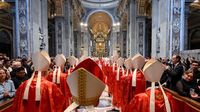Pope Francis has been laid to rest, and a new pope has been elected after deliberation by the cardinals. The conclave, which began following the death of Pope Francis on April 21, 2025, saw the election of Robert Prevost, who is now known as Pope Leo XIV, marking a historic moment as he becomes the first American-born pope in the Catholic Church's 2,000-year history.
The election process, steeped in tradition, unfolded rapidly after the cardinals reached a two-thirds majority. In a world where only seven papal elections have occurred in the last century, the urgency of this conclave was palpable. The first announcement of a new pope is signaled by the ringing of bells at St. Peter's Basilica and the emergence of white smoke from the Sistine Chapel chimney, a moment that sends a surge of excitement among the faithful gathered below.
As the cardinals gathered in the Sistine Chapel, they were cut off from the outside world, voting in secrecy beneath Michelangelo's masterpieces. The process is designed to be contemplative, with the Holy Spirit guiding their decisions. This conclave began with a morning Mass, and after two rounds of voting resulted in black smoke, anticipation built as the cardinals prepared for further ballots.
Once a candidate receives the necessary votes and accepts the papacy, he chooses a papal name and enters the "Room of Tears" to don his vestments. The weight of the responsibility is significant, and as history has shown, the choice of name can signal the new pope's priorities. In this case, Prevost chose the name Leo XIV, a nod to the legacy of previous popes named Leo, known for their strong leadership.
Pope Leo XIV, a 69-year-old member of the Augustinian religious order, is a Chicago native who spent much of his career as a missionary in Peru. His election reflects a shift in the Catholic Church towards greater geographical diversity, with 108 of the 133 cardinals who voted having been appointed by Francis himself. This connection may influence the direction Leo XIV takes as he leads the Church.
In his first address from the loggia of St. Peter's Basilica, Pope Leo XIV greeted the crowd with a message of peace, saying, "Peace be with you." He emphasized his identity as a Christian and a bishop, stating, "So we can all walk together." His words resonated with the thousands gathered in St. Peter's Square, where cheers erupted as they awaited the announcement of their new leader.
Leo XIV's election also comes with historical significance, as he is the first pope to hail from the United States. This milestone reflects changing attitudes within the Church, as there had long been a taboo against an American pope due to the geopolitical influence of the U.S. in the secular realm. His appointment signals a potential shift in how the Vatican engages with global issues, particularly in light of Pope Francis's focus on social justice, climate change, and migration.
After the announcement of his election, the new pope donned the traditional red cape of the papacy, a garment that his predecessor had chosen to forgo. This symbolic act of wearing the papal attire marks the beginning of a new chapter in the Church's history. The Fisherman's Ring, a symbol of papal authority, was ceremonially presented to him, further solidifying his role as the leader of the Roman Catholic Church.
As Pope Leo XIV steps into his new role, the world watches closely. His first public appearance included the traditional blessing known as the "Apostolic Urbi et Orbi," meaning "to the city and the world." This blessing serves as an indication of the new pope's priorities and the direction he intends to take the Church.
The ceremonial mass to formally install Pope Leo XIV is expected to take place about a week after his election, attended by cardinals, bishops, and international dignitaries. While the installation ceremony historically featured elaborate pageantry, much of this has been streamlined in recent years, reflecting a more modern approach to the papacy.
In the coming days and weeks, the new pope's actions and decisions will be closely scrutinized as he navigates the complexities of leading a global institution with over 1.4 billion followers. The priorities he sets will likely reflect a blend of continuity with Pope Francis's legacy and his unique vision for the future of the Church.
As Pope Leo XIV embarks on this journey, he carries not only the hopes of the Catholic community but also the expectations of a world seeking moral guidance amid various challenges. The significance of his election extends beyond the walls of the Vatican, as it represents a moment of profound change in the Catholic Church's history.
With the world watching, Pope Leo XIV's tenure promises to be a pivotal one, potentially reshaping the Church's role in addressing pressing global issues and fostering dialogue among diverse communities. As he begins his papacy, the faithful and observers alike await to see how he will lead the Church into a new era.




